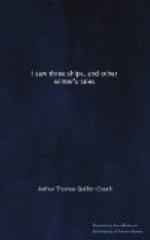So when the fiddles struck up the air of “Randy my dandy,” Zeb, knowing that the company would call upon him, at first felt his heart turn sick with loathing. He glanced across the room at Ruby, who, with heightened colour, was listening to the stranger, and looking up at his handsome face. Already one or two voices were calling “Zeb!” “Young Zeb for a hornpipe!” “Now then, Young Zeb!”
He had a mind to refuse. For years after he remembered every small detail of the room as he looked down it and then across to Ruby again: the motion of the fiddle-bows; the variegated dresses of the women; the kissing-bush that some tall dancer’s head had set swaying from the low rafter; the light of a sconce gleaming on Tresidder’s bald scalp. Years after, he could recall the exact poise of Ruby’s head as she answered some question of her companion. The stranger left her, and strolled slowly down the room to the fireplace, when he faced round, throwing an arm negligently along the mantel-shelf, and leant with legs crossed, waiting.
Then Young Zeb made up his mind, and stepped out into the middle of the floor. The musicians were sawing with might and main at high speed. He crossed his arms, and, fixing his eyes on the stranger’s, began the hornpipe.
When it ceased, he had danced his best. It was only when the applause broke out that he knew he had fastened, from start to finish, on the man by the fireplace a pair of eyes blazing with hate. The other had stared back quietly, as if he noted only the performance. As the music ended sharply with the click of Young Zeb’s two heels, the stranger bent, took up a pair of tongs, and rearranged the fire before lifting his head.
“Yes,” he said, slowly, but in tones that were extremely distinct as the clapping died away, “that was wonderfully danced. In some ways I should almost say you were inspired. A slight want of airiness in the double-shuffle, perhaps—”
“Could you do’t better?” asked Zeb, sulkily.
“That isn’t the fair way to treat criticism, my friend; but yes—oh, yes, certainly I could do it better—in your shoes.”
“Then try, i’ my shoes.” And Zeb kicked them off.
“I’ve a notion they’ll fit me,” was all the stranger answered, dropping on one knee and beginning to unfasten the cumbrous boots he had borrowed of Farmer Tresidder.
Indeed, the curious likeness in build of these two men—a likeness accentuated, rather than slurred, by their contrast in colour and face, was now seen to extend even to their feet. When the stranger stood up at length in Zeb’s shoes, they fitted him to a nicety, the broad steel buckles lying comfortably over the instep, the back of the uppers closing round the hollow of his ankle like a skin.
Young Zeb, by this, had crossed shoeless to the fireplace, and now stood in the position lately occupied by his rival: only, whereas the stranger had lolled easily, Zeb stood squarely, with his legs wide apart and his hands deep in his pockets. He had no eyes for the intent faces around, no ears for their whispering, nor for the preliminary scrape of the instruments; but stood like an image, with the firelight flickering out between his calves, and watched the other man grimly.




